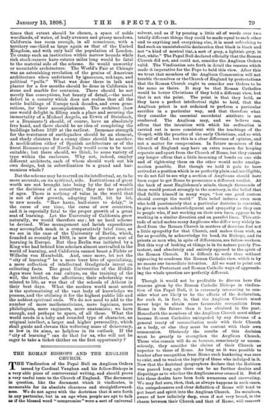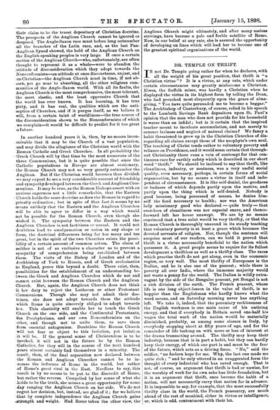THE ROMAN BISHOPS AND THE ENGLISH CHURCH. T HE Vindication of
the Papal Bull on Anglican Orders issued by Cardinal Vaughan and his fellow-Bishops is a very able piece of controversial writing, and should prove a very useful tonic to the Church of England. The document in question, like the document which it vindicates, is memorable for its absolute clearness and straightforward- ness. We do not agree with the doctrines that it sets forth in any particular, but in an age when people are apt to talk as if the blessed word "compromise "were a sort of universal solvent, and as if by pouring a little oil of words over two totally different things they could be made equal to each other and to anything and everything else, it is most refreshing to find such an unmistakeable declaration that black is black and not "a kind of neutral tint, a sort of grey, a lightish grey, in fact, white." The Papal Ball declared officially that the Roman Church did not, and could not, consider the Anglican Orders valid. The Vindication sets forth in detail the reasons which made it imperative for the Pope to hold this view. After this we trust that members of the Anglican Communion will not trouble themselves or the Church of England by protestations that the Roman Church ought to consider our Orders to be the same as theirs. It may be that Roman Catholics would be better Christians if they held a different view, but that is not the point. The point is that they hold, as they have a perfect intellectual right to hold, that the Anglican priest is not ordained to perform a particular sacrifice in a particular way, and that therefore what they consider the essential sacerdotal attribute is not conferred. The Anglican may, and we believe can, affirm that the intention with which his ordination is carried out is more consistent with the teachings of the Gospel, with the practice of the early Christians, and so with the will of God; but this is a clear difference of opinion, and not a matter for compromises. In future members of the Church of England may have an extra reason for keeping separate and apart from the Church of Rome, but they cannot any longer affirm that a little loosening of bonds on one side and of tightening them on the other would make amalga- mation possible. But though we hold it gain to have arrived at a position which is so perfectly plain and intelligible, we do not fail to see why a section of Anglicans should have been eager to get Rome to pronounce a different verdict. At the back of most Englishmen's minds, though thousands of them would protest strongly to the contrary, is the belief that God fulfils himself in many ways, "lest one good custom should corrupt the world." This belief induces even men who hold passionately that a particular doctrine is essential, to give as much acknowledgment and sympathy as they can to people who, if not working on their own lines, appear to be working in a similar direction and on parallel lines. This atti- tude of mind makes many Anglicans who differ very widely in- deed from the Roman Church in matters of doctrine feel not a little sympathy for that Church, and makes them wish, as far as possible, to acknowledge its head, its Bishops, and its priests as men who, in spite of differences, are fellow-workers. Bat this way of looking at things is in its nature purely Pro- testant, and absolutely and entirely opposed to the spirit of the Roman Church. It is difficult to write thus without appearing to condemn the Roman Catholic view, which is by no means our immediate intention. All we want to point out is that the Protestant and Roman Catholic ways of approach- ing the whole question are perfectly different.
Though it would not be profitable to discuss here the reasons given by the Roman Catholic Bishops in vindica- tion of the Papal Bull, it is extremely interesting to con- sider what are likely to be the effects of the declaration, for such it, in fact, is, that the Anglican Church must never hope to obtain more favourable recognition from Rome in the future than it has obtained in the past. Henceforth the members of the Anglican Church must either become Roman Catholics unimpeded by any dreams of a general treaty of reconciliation made with their Church as a body, or else they must be content with their own communion. Obviously the results of this decision must be greatly to strengthen the Anglican Church. Those who remain will do so because, consciously or uncon- sciously, they consider the claims of their Church as superior to those of Rome. As long as it was possible to hanker after recognition from Rome such hankering was sure to exist, and to weaken the loyalty of those who indulged in it. Now that the doctrinal geographers declare that the Rubicon was passed long ago there can be no further doubts and disputings as to whether the Anglicans ever crossed it. But of late these doubts have been both numerous and enervating. We may feel sure, then, that, as always happens in such cases, the outspokenness and clear definition of Rome will tend to put heart and spirit into the Anglican Church. Its members, aware of how infinitely deep, even if not very broad, is the chasm between their Church and that of Rome, will reassert
their claim to be the truest depositary of Christian doctrine. The prospects of the Anglican Church cannot be ignored or despised. The Anglo-Saxon race must before long outnumber all the branches of the Latin race, and, as the last Pan- Anglican Synod showed, the hold of the Anglican Church on the English-speaking peoples is very large. If once a certain section of the Anglican Church—who, unfortunately, are often thought to represent it as a whole—were to abandon the attitude of disconsideration which they adopt towards the Nonconformists—an attitude at once discourteous, unjust, and nn-Christian—the Anglican Church must in time, if not ab- sorb, yet go near to absorbing, all the other religious com- munities of the Anglo-Saxon world. With all its faults, the Anglican Church is the most comprehensive, the most tolerant, the most elastic, and the least oppressive Church that the world has ever known. It has learning, it has true piety, and it has zeal, the qualities which are the anti- septics of Churches, and if it purges itself, as we believe it will, from a certain taint of worldliness—the true source of the disconsideration shown to the Nonconformists of which we complain—it would be difficult to predict for it too great a future.
In another hundred years it is, then, by no means incon- ceivable that it may be the Church of a vast population, and may divide the allegiance of the Christian world with the Roman Catholic and Greek Churches. In all probability the Greek Church will by that time be the most numerous of the three Communions, but it is quite possible that since the Catholic populations in Europe are almost stationary, the Roman Church may not so very greatly outnumber the Anglican. But if the Christian world becomes thus divided, we may expect to see a very considerable amount of friendship and sympathydeveloped between the Greek and Anglican Com- munions. It may be true, as the Roman Bishops assert with an anxious eagerness not a little remarkable, that the Eastern Church holds the same doctrine as does the Roman in regard to priestly ordination ; but in spite of that fact it seems by no means unlikely that the Eastern and the Anglican Churches will be able to agree to differ in a way which would not be possible for the Roman Church, even though she wished it. The sympathy between the Eastern and the Anglican Churches is not factitious or unreal. It could not doubtless lead to amalgamation or union in any shape or form, the doctrinal differences being far too many and too great, but in the spirit of the two Churches exists the possi- bility of a certain amount of common action. The claim of neither is not of so exclusive a character as to prevent a sympathy of comprehension being established between them. The visits of the Bishop of London and of the A rchbishop of York to Russia, and of Greek ecclesiastics to England, prove this beyond a doubt. There exist, then, possibilities for the establishment of an understanding be- tween the Greek and Anglican Churches which do not and mnnot exist between the Roman Church and the Anglican 'Church. But, again, the Anglican Church does not think it her duty to reject the Lutheran or other Protestant .Communions. Though she may not admit their doc- trines, she does not adopt towards them the attitude which Rome is quite sincerely obliged to adopt towards her. This elasticity will enable her to touch the Greek Church on the one side, and the Continental Protestants, the Presbyterians, and our own Nonconformists on the
• other, and though not to unite them, to save them from essential antagonism. Doubtless the Roman Church will not fear or object to this isolation, yet isolatiJn it will be. If the general sense of Christendom is to be invoked, it will not in the future be by the Roman Catholics, for they will in the course of the next hundred years almost certainly find themselves in a minority. The -result, then, of the final separation now declared between the Roman and Anglican Churches cannot be to in- crease the influence of Rome in the world, but rather of Rome's great rival in the East. Needless to say, this result is by no means to be put to the discredit of Rome, but rather the reverse. Compelled by her sense of what she holds to be the truth, she misses a great opportunity for some "ay ranging the Anglican Church on her side. We do not regret her decision, but, instead, are glad of it ; for we believe that by complete independence the Anglican Church gains -strength and weight. Had Rome taken the other view, the
Anglican Ohurch might ultimately, and after many useless strivings, have become a pale and feeble satellite of Rome. Now, in our belief at any rate, she is assured the opportunity of developing on lines which will lead her to become one of the greatest spiritual organisations of the world.



































 Previous page
Previous page